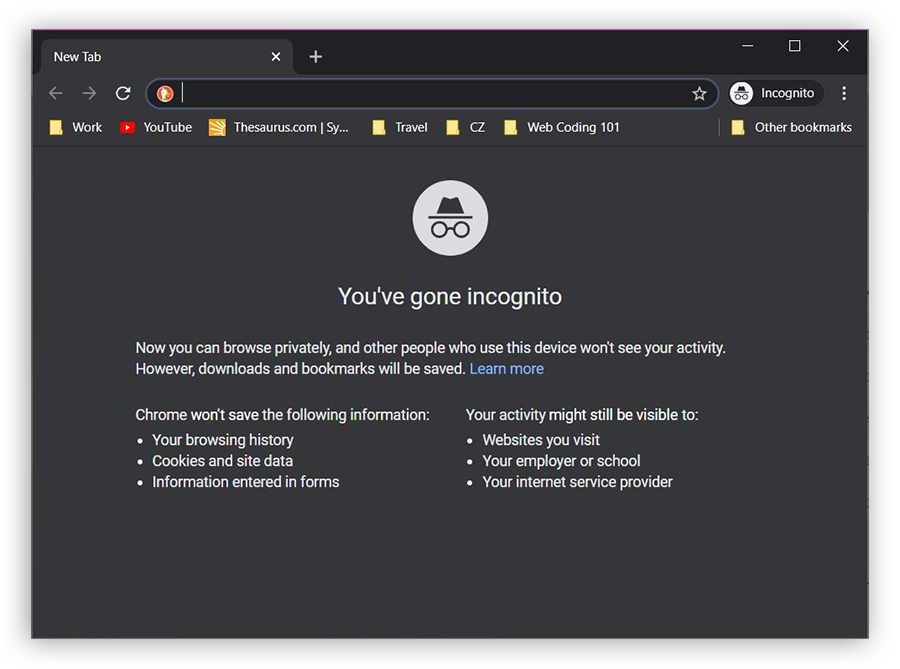I don’t use chrome but this is a whole lot of nothing. It’s basically saying if you save a file or an article to your reading list it’ll still be there…and that remote websites will still stuff your face with cookies and try to track you…but it’s not like they’re giving you a special chrome cookie to link your private and non private browsing. Server side tracking never goes away, not even with Firefox.
Anyways, who cares. Delete chrome and start using Firefox. But again, make sure you delete the files you download in incognito or they’ll still be there. And your ISP can still see which domains you’re going to if you use them as your DNS.
And your ISP can still see which domains you’re going to if you use them as your DNS.
Just so you know, because TLS SNI is not encrypted and not yet universally obfuscated (adoption of this is pretty slow and one of the largest CDN providers had to pause their rollout last I checked), not-even-barely-deep packet inspection can be used to track the sites you visit regardless of your DNS provider or wherever resolution is encrypted. Just do a packet dump and see.
Also, if a website isn’t fronted by one of the most popular CDN providers in existence, it can be possible to infer the sites you’re visiting based on their server IP addresses.
Although this just shifts where tracking can occur, a VPN is the only reliable way to maybe prevent your ISP from tracking the sites you visit, if this is your desire.
Yep, I’m aware. It’s how that one guy hacked his airplanes wireless, by setting up a certificate with his domain and the airlines and then using that domain + port 443 as an ssh or vpn tunnel.
So TLS rollout is slow because the websites can still be seen with packet inspection? We’re talking about TLS 1.4 right?
I’m not sure if it’s part of a TLS standard yet but I was talking about encrypted SNI (ECH, formerly called ESNI).
Today, early on in a TLS connection, the client actually tells the server, in plain text, the domain name it’s intending to communicate with. The server then presents a response that only the owner of that domain can produce, then keys are exchanged and the connection progresses, encrypted. This was required to allow a single server to serve traffic on multiple domains. Before this, a server on an IP:Port combo could only serve traffic on a single domain.
But because of this, a man in the middle can just read the ClientHello and learn the domain you’re intending to connect to. They can’t intercept any encapsulated data (e.g. at the HTTP level, in the case of web traffic) but they can learn the domains you’re accessing.
ECH promises to make the real ClientHello encrypted by proceeding it with a fake ClientHello. The response will contain enough information to fetch a key that can be used to encrypt the real ClientHello. Only the server will be able to decrypt this.
Okay Chrome lovers, talk yourself out of this one…
Well you see, it’s used by virtually everything. So get used to it. is all I imagine people saying, not my opinion.
Ahh yes, the good ole, “you don’t have a choice” nonsense. 😉
I can bitch about chrome all day long… but none of that bitching will be about incognito mode as that was and continues to be an useful feature that did exactly what I expected it to do. Everything it said it did, it did.
Just because people made up their own imaginary ideas about what they think it does isn’t really Google’s fault. If people think snorkels allow them to scuba dive and then drown, I’m not about to blame the snorkel maker that wrote ‘diving googles and snorkel’ on the packaging.
I switched away from chrome a while ago, but this is just stupid. Incognito has always said that it can’t stop sties from tracking you. It’s always been about stopping stuff from being stored locally. Here’s the message:

If you read that and thought it did more than it said, that’s on you.
I’m curious as to what led people to believe otherwise before this update. I don’t use chrome but I recall it always being reffered to as porn mode. Meaning it just doesn’t save browsing history, no more no less.
Did Google have misleading wording implying it was doing anything else?
It also doesn’t preserve cookies after closing the window. I’m also curious what people expect that mode to do.
Well, full incognito I guess, no trace for you, you can surf even the deep web… That for the less technical folks ofc.
It seems the whole last decade has been focused on dumbing the Internet down for the dumbest 10% of the population. The Internet was better when it was less inclusive.
There’s money to be made with more people on the Internet, and especially dumb people. So that’s where it’s going.
Have you seen when people cry when Netflix removes beloved content for them?
Pathetic.
I don’t understand paying for streaming media at all… but I’m from the before times.
I remember interviews with the development team about it. As far as I know they were always clear what was happening on the back end.
Did Google have misleading wording implying it was doing anything else?
Do they literally have anything else?
Firefox’s private browsing description is pretty solid if anybody managed to read it
Care to elaborate?
I mean you can open up Firefox and check for yourself but here is an image I found online of it

I find this very silly. Incognito always had disclaimers about how it doesn’t protect you from tracking. Do people not know Google is just a website that does taking (or did anyway) like any other? And how tf did Google lose that lawsuit when eulas have “this software isn’t fit for any purpose” clauses
and incognito was never advertised for privacy to begin withand straight up tells you it doesnt give you privacy when you open it.If I had to guess, is because the mode’s very name strongly tells you so?
Definition– adjective (of a person) having one’s true identity concealed. “in order to observe you have to be incognito”
adverb in a way that conceals one’s true identity. “he is now operating incognito”
noun an assumed or false identity. “she is locked in her incognito”
having one’s true identity concealed
Which is exactly what the incognito mode does. Being incognito doesn’t mean you can’t be tracked in your fake identity
not protecting users from tracking is very different than wantonly tracking users yourself when they literally hit the privacy button
I would think such a thing would be a bigger liability. Because even if Google stops tracking you other trackers wouldn’t. If people didn’t read and understand “this does not protect against trackers” they definitely aren’t going to do that with “this will stop Google’s trackers but not 3rd party ones”.
“If you’re concerned, for whatever reason, you do not wish to be tracked by federal and state authorities, my strong recommendation is to use [Google Chrome’s] incognito mode.”
- Eric Schmidt, 2014
I stand corrected
Good to see Google finally fixing issues
I was always curious why is it called Incognito or Private mode? Temporary or Guest session would make more sense: “You’ve entered a Temporary session. Your browsing history and cookies will not be saved.”
I don’t believe it was ever called ‘private mode’, or am I wrong on this?
Private Mode is on Firefox.
Safari and Brave also both call it a private window
Private Browsing, for browsing private parts.
private browsing term appears in desktop and Android. Apple also uses the term.
If you don’t want to be tracked just use LibreWolf or Tor
I’d say give a try to Firefox
Isn’t Librewolf fork of Firefox with hardened features pre-enabled?
It is.
You could argue that the security patches Mozilla applies takes time to be applied to Librewolf, and also that all you need to do in Firefox is change a couple of options in the settings. People debate over which one matters more, having better privacy defaults or being extremely quick to patch exploits.
In the real world I imagine it hardly matters.
Just recently made the switch to Firefox. What settings do I need to change?
LibreWolf is just Firefox but better and Tor is Firefox but maximum privacy
WaterFox too
Never personally used it but seems nice
I can’t remember the last time I used Google Chrome.
Nothing but Firefox and a Linux chromium browser.
Unfortunately I have it installed to double-check things and occasional compatibility purpose. Believe it or not, sites have started to appear who work in Chrome but not Firefox. Solution is most likely perfectly simple but developers just don’t want to deal with it so I’ve been told “just use Chrome” few times in past few years.
Yep. There’s the occasional rare site that demands chrome. That’s when chromium comes in handy. I can’t think of a single site I use that I’m willing to install chrome for. Your needs are different, though.
Talk about easy way out. “There, problem solved. It’s not a violation if we write it somewhere in tiny font.”
The amount of words needed to fully explain this to tech illiterate idiots would be so many that those idiots would just argue they cannot be expected to read all of it. These people already do this with the terms + conditions documents they agree to.
Incognito mode did every single thing it said it did and behaved exactly as I expected from day one. Is there a single user here who actually was surprised by how it worked? Did anyone honestly think it was like Tor or something? Why? Where did anyone ever get that idea at all?
Expected incognito functionality sits in the gaping chasm between actual incognito functionality and TOR. When I’m being told I can go incognito - you know, sneaky, in disguise, I don’t expect to have all of my activity broadcast back to those that say I’m incognito.
Of course, trusting current Google is foolish, but that doesn’t make it less deceptive.
So do you feel the naming was inherently misleading which led you astray? Because incognito mode absolutely kept things ‘sneaky’ in terms of hiding the things I look up from other people who use the same computer. Which is specifically what Google said it would do and showed examples of in TV commercials. And it definitely did (and still does) that.
I’m also struggling to understand what you feel you ‘trusted’ Google on exactly. What did they tell you that you believed but, as it turns out, was not true?
All google products track you. Don’t use Google products.
deleted by creator










